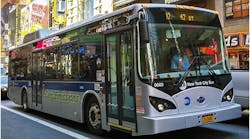Governor Andrew M. Cuomo recently announced a series of initiatives to increase the number of electric buses in New York as part of the state's efforts to mitigate climate change, create healthier communities, improve air quality, and boost access to clean transportation in underserved communities.
Specifically, this effort includes US$16.4 million in incentives for the expansion of electric bus usage among public transportation authorities, as well as US$2.5 million for school bus operators to acquire cleaner forms of transportation with lower emissions. These measures will help take polluting vehicles out of service across the state to reduce greenhouse gas emissions and improve air quality in support of Cuomo's clean energy and climate goals in the Climate Leadership and Community Protection Act.
"Electrifying transit and school buses at scale is an important step in our fight against climate change and is essential in helping us reach our ambitious goals to create a greener New York State," Cuomo said. "Through these initiatives, bus operators will now have the support and resources they need to modernize their fleets, reduce emissions, and ensure underserved communities have cleaner public transit options as we work to further reduce our carbon footprint."
Under the New York Truck Voucher Incentive Program (NYTVIP), US$16.4 million Volkswagen settlement funding is being made available to five of the largest public transit operators in the state — the Capital District Transportation Authority, Niagara Frontier Transportation Authority, Rochester-Genesee Regional Transit Authority, Suffolk County Transportation, and Westchester County Bee-Line Bus System — to facilitate their fleets' transition toward 100% zero-emissions fleets by 2035, a goal Cuomo announced in his 2020 State of the State Address.
Under this program, purchasers of new, zero-emissions all-electric transit buses are eligible to have 100% of the incremental vehicle cost covered on the condition that these buses are housed at bus depots or operate on routes located within a half-mile of a disadvantaged community. This funding builds on the NYTVIP expansion announced in 2020. Combined, these transit operators currently run more than 1300 transit buses.
To provide further support, the New York State Energy Research and Development Authority (NYSERDA) and the New York Power Authority (NYPA) have reached an agreement which includes more than US$1 million in funding for a new program to help the five large upstate and suburban transit operators develop plans to convert to all-electric transit buses. Through this program, the NYSERDA and the NYPA will work with a competitively selected, pre-qualified contractor to study how to transition to electric bus fleets and install the needed charging stations in a cost-effective way. Areas of study include transit operated facilities and parking lots that could become large-scale charging hubs, utility upgrades, route-based charging, the need for high-speed charging to extend bus range, resiliency planning, and the need for backup power solutions.
Another US$2.5 million is also available now through the NYTVIP to school bus operators statewide to support the purchase of cleaner, less polluting buses. Funding will help cover up to 100% of incremental costs for all-electric school buses operating near a disadvantaged community. The program reduces the cost to purchase new, clean electric or alternative-fueled buses through point of sale rebates offered through a qualified vendor.
The New York State Office of General Services (OGS) also issued a request for information (RFI) on Dec. 23, 2020, seeking details from manufacturers and dealers about electric and hybrid transit buses currently available in the marketplace. Responses to the RFI, which are due by Jan. 21, will be used to develop a solicitation for electric and hybrid buses with the goal of providing transit authorities with options for purchasing green vehicles for their fleets.
The NYTVIP also offers funding for businesses and municipalities that want to purchase new, clean electric vehicles (EVs) or repower commercial trucks. The NYTVIP is administered by the NYSERDA in partnership with the New York State Department of Transportation (NYSDOT) and the New York State Department of Environmental Conservation. The US$63.4 million for the program comprises US$53.4 million from the state's US$127.7 million federal allocation from the Volkswagen settlement, which is directed by the multi-agency Clean Transportation NY plan, and approximately US$10 million in federal air quality improvement funds allocated to the NYSDOT. The NYSDOT has provided an additional US$7 million in direct assistance to facilitate the electrification of upstate transit fleets.
Doreen M. Harris, acting president and CEO of NYSERDA and Climate Action Council co-chair, said: "By working with regional transit and school bus fleet operators we are removing dirty, polluting vehicles from our roadways and helping communities eliminate the health and environmental risks from carbon emissions. Investing in all-electric buses and offering transit authorities technical assistance shows the serious commitment that we are making under the governor's plan to provide access to clean transportation options for all New Yorkers."
Gil C. Quinones, president and chief executive officer of the NYPA, said: "Reducing greenhouse gas emissions from transportation will require a full court press and electrifying public transportation is a key part of our offense. Bus transportation offers a prime opportunity to help lower greenhouse gas emissions, especially in underserved communities across our state. The NYPA is pleased to collaborate with its sister agency NYSERDA and our other partners to evaluate the best ways to cost-effectively transition more municipal bus fleets to low- to zero-carbon emission technologies."
New York State's US$1 billion investment in electrifying New York's transportation sector is vital to Cuomo's climate and clean energy plan. Growing access and availability to EVs and scaling the necessary infrastructure benefits all New Yorkers, including those in low-income or disadvantaged areas, by reducing carbon emissions to create cleaner air and healthier communities.


